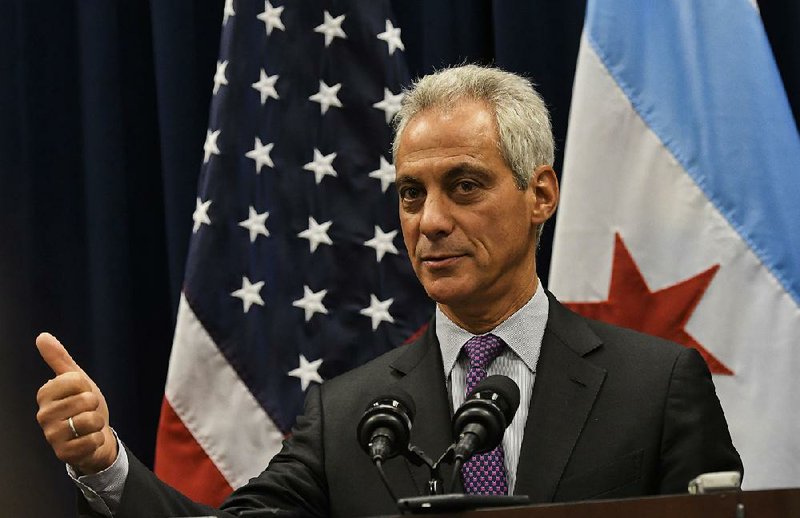CHICAGO -- Chicago police Superintendent Eddie Johnson said Wednesday that he's baffled by the meaning of President Donald Trump's latest tweet on Chicago violence but said he would oppose calling in the National Guard if that is what the president is considering.
RELATED ARTICLES
http://www.arkansas…">Trump moves to build wall along border http://www.arkansas…">Draft order opens pathway to revive 'black site' lockups http://www.arkansas…">50-project list not from White House, Trump team says http://www.arkansas…">CEO for Trump hotels hints at adding U.S. sites
"The statement is so broad. I have no idea what he's talking about," Johnson said of Trump's tweet Tuesday night threatening to "send in the Feds!" if Chicago "doesn't fix the horrible 'carnage.'"
In a telephone interview, Johnson said he hasn't been contacted by the Trump administration and didn't believe that Mayor Rahm Emanuel or other city officials had been either.
Emanuel was asked Tuesday night in an interview on WTTW-TV about the White House website citing violence in Chicago. Emanuel said federal agencies could do more to help in the city.
[PRESIDENT TRUMP: Details on administration, previous coverage, photos, videos]
"There's a lot the federal government can do," Emanuel said. He talked about gun control, use of federal resources to track illegal guns and federal prosecutions. "And also, fundamentally, in my view, also help fund additional police officers."
If Trump meant in his tweet that he might send in the National Guard to help quell the city's violence, Johnson said he would be opposed to that.
He was not sure what authority the troops would have, but he didn't believe that they would have the power to make arrests.
"They're not trained for this type of action," he said.
Johnson said he does not oppose increased assistance from the federal government -- whether that would mean more agents from the FBI or the Bureau of Alcohol, Tobacco, Firearms and Explosives or more help geared toward youths living in Chicago's most violent neighborhoods.
"We would use [federal funding for] mentorship programs, after-school programs," he said. "Those are the things I think we can use."
Alderman Pat Dowell said the city could use federal money for jobs and education programs, but she and other aldermen worried that the president intends to send in the National Guard.
"We could use some federal help. I don't think it should come in the form of troops," Dowell said. "And I'm not sure what he meant by federal help. But in my mind, he's a law-and-order president. I'm thinking he's thinking troops. So I don't necessarily think we need that, but I do think we need some help from the federal government, whether it's investing in neighborhoods, jobs, jobs over jails.
"I don't think we need troops in the city," Dowell said. "Nobody wants to be subject to a curfew, home-to-home searches, cordoning off neighborhoods. I think we need more investment in terms of jobs, investment in our schools."
Alderman Toni Foulkes said it would be a mistake to think sending National Guard units into the city's black neighborhoods would improve conditions in those communities, where there is already a distrust of law enforcement officials.
"When the National Guard gets involved, you end up with curfews, militarization of neighborhoods," said Foulkes, who represents parts of Englewood, West Englewood, Chicago Lawn and Gage Park. "And especially in places like Englewood, neighborhoods where residents already feel like there's a racial basis to some of these decisions, that will not help matters."
Cardinal Blase Cupich, who was at City Hall to be honored for his recent elevation to cardinal, said the situation is "more complex" than one that can be dealt with simply by posting federal troops on Chicago streets. "The problem is surely much more complex than that type of a solution," he said. "I surely would welcome, and I think a lot of people would welcome, assistance on a multilevel basis, simply because the problem is not simple. It is complex, and it can be improved if we all pull together."
Trump released his tweet a day before aldermen were to vote on a nonbinding resolution reaffirming that Chicago protects all residents regardless of race, ethnicity, immigration status, criminal record, gender identity and sexual orientation -- a measure timed to give the council another chance to speak out against the president's proposals on immigration matters.
Trump tweeted that "if Chicago doesn't fix the horrible 'carnage' going on, 228 shootings in 2017 with 42 killings (up 24 percent from 2016), I will send in the Feds!"
Homicides exceeded 760 in 2016, the worst in two decades, and seemingly runaway violence has continued so far in January.
Trump's tweet came after Fox TV's Bill O'Reilly on Tuesday aired a segment on "chaos in Chicago," concluding that "President Trump can call in the National Guard because the governor won't."
Information for this article was contributed by John Byrne and Hal Dardick of the Chicago Tribune.
A Section on 01/26/2017
